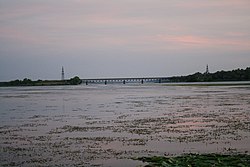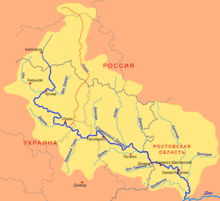| Oskil | |
|---|---|
 Oskil near Kruhliakivka | |
 Donets river basin. The Oskil (red) is the northernmost large tributary | |
| Native name | |
| Location | |
| Country | Russia, Ukraine |
| Physical characteristics | |
| Mouth | Donets |
• coordinates | 49°06′00″N 37°24′31″E / 49.1001°N 37.4087°E |
| Length | 472 km (293 mi) |
| Basin size | 14,800 km2 (5,700 sq mi) |
| Basin features | |
| Progression | Donets→ Don→ Sea of Azov |
 | |
The Oskil or Oskol[1] (Ukrainian: Оскiл; Russian: Оскол) is a south-flowing river in Russia and Ukraine. It arises roughly between Kursk and Voronezh and flows south to join the Siverskyi Donets which flows southeast to join the Don. It is 472 kilometres (293 mi) long, with a drainage basin of 14,800 square kilometres (5,700 sq mi).[2]
The river has its sources on the Central Russian Upland, and flows through Kursk and Belgorod Oblasts in Russia, and through the eastern part of Kharkiv Oblast in Ukraine, where it joins the Seversky Donets river. An artificial lake, the Oskil Reservoir, was created in 1958 to help with flood protection and as a source of electricity.[citation needed]
There are several towns along the Oskil: Stary Oskol, Novy Oskol and Valuyki in Russia, and Kupiansk, Kupiansk-Vuzlovyi, Kivsharivka, Borova and Dvorichna in Ukraine.[citation needed]
On March 31, 2022, during the Russian invasion of Ukraine, the Oskil Dam was destroyed.[3] In September of 2022, to resist the 2022 Ukrainian Kharkiv counteroffensive, Russian forces unsuccessfully used the Oskil River as a defensive barrier.[4][5]
References
[edit]- ^ "Stary Oskol". Encyclopaedia Britannica.
It lies along the Oskol River.
- ^ «Река Оскол», Russian State Water Registry
- ^ "Endangered birds, new ecosystems, and a bunch of lakes: how the former Oskil Reservoir lives a year after the destruction". Rubryka. August 23, 2023.
- ^ David Axe (27 September 2022). "The Ukrainian Army Reportedly Destroyed Another Russian Division". Forbes. Retrieved 27 September 2022.
- ^ Hernandez, Marco; Lu, Denise (2022-09-21). "Can Ukraine Break Through Again?". The New York Times. ISSN 0362-4331. Retrieved 2022-09-21.